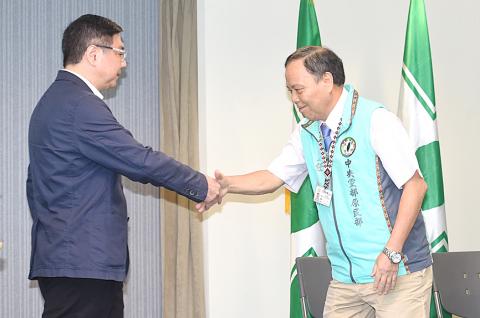A dispute broke out among Democratic Progressive Party (DPP) officials yesterday over the appointment of Tseng Chih-hsiang (曾志湘) as director of the party’s Department of Indigenous Affairs, after it was revealed that he had previously held pro-China views and promoted cross-strait political events.
During an interview just before the presidential election in January 2016, Tsai said: “If the pan-blue and pan-green parties do a bad job governing, while the Chinese Communist Party [CCP] has the means to do better, then I welcome the CCP to take charge,” the Chinese-language news site Mirror Media reported.
At the time, Tseng was chief of Taoyuan’s Fusing District (復興), a mountain Aboriginal region.

Photo: Liu Hsin-de, Taipei Times
He assumed office as an independent after then-district chief Fan Cheng-hsing (范振興) was removed upon being convicted of vote-buying in 2015.
Tseng, an Atayal, was a member of the Chinese Nationalist Party (KMT), but ran in the local elections in 2014 as an independent.
According to Mirror Media, in late 2016, Tseng in a separate interview with the China News Review agency in Hong Kong, which is reportedly funded by Beijing, said that the government’s New Southbound Policy is no help to the nation’s Aborigines, saying: “It is more pragmatic to go with the ‘two sides of the Taiwan Strait are one family’ policy. We are coordinating Taiwan’s five major Aboriginal regions ... to visit China to promote tourism and agricultural products.”
DPP Chairman Cho Jung-tai (卓榮泰) defended Tseng’s appointment, saying that his previous remarks represented his job and background at the time.
“Now that he has joined our party, it is more important for him to work according to our party’s plans and requirements,” he said.
Cho then showed a photograph of his old KMT membership card, saying: “Even I was a KMT member in the past. There are too many people who once belonged with the KMT... Now we welcome them to become DPP members.”
Tseng reportedly also promoted political events in Taiwan and China, and established good rapport with Chinese officials in charge of propaganda and “united front” activities targeting Taiwanese officials.
Local Chinese-language media reported that Tseng in June 2016 went to Pingtan Island in China’s Fujian Province to participate in a cross-strait political forum, and invited a number of Chinese provincial officials to Aboriginal celebrations in Fuhsing District the following month.
Tseng had good relations with Fang Ming (方明), deputy director of China’s Taiwan Affairs Office chapter in Pingtan, who led a Chinese delegation to the celebrations, Mirror Media reported.
Critics said that the DPP is drawing up legal amendments to restrict and introduce more severe punishments for people and businesses working on behalf of the Chinese government.
Tseng could leak the DPP’s internal discussions on national security, election campaign strategy and other sensitive issues, they said.
People within the party have complained about DPP Secretary-General Luo Wen-jia’s (羅文嘉) choice of Tseng, as well as other appointements.
Earlier this month, DPP Legislator Wang Ting-yu (王定宇) threatened to resign from the DPP Central Standing Committee in a row with Luo, saying: “The party headquarters is controlled by a small clique that makes job appointments on its own.”

The Ministry of Economic Affairs has fined Taobao NT$1.2 million (US$36,912) for advertisements that exceed its approved business scope, requiring the Chinese e-commerce platform to make corrections in the first half of this year or its license may be revoked. Lawmakers have called for stricter enforcement of Chinese e-commerce platforms and measures to prevent China from laundering its goods through Taiwan in response to US President Donald Trump’s heavy tariffs on China. The Legislative Yuan’s Finance Committee met today to discuss policies to prevent China from dumping goods in Taiwan, inviting government agencies to report. Democratic Progressive Party Legislator Kuo Kuo-wen (郭國文) said

The Ministry of Economic Affairs has fined Taobao NT$1.2 million (US$36,900) for advertisements that exceeded its approved business scope and ordered the Chinese e-commerce platform to make corrections in the first half of this year or its license would be revoked. Lawmakers have called for stricter supervision of Chinese e-commerce platforms and more stringent measures to prevent China from laundering its goods through Taiwan as US President Donald Trump’s administration cracks down on origin laundering. The legislature’s Finance Committee yesterday met to discuss policies to prevent China from dumping goods in Taiwan, inviting government agencies to report on the matter. Democratic Progressive Party

Taiwan and its Pacific ally Tuvalu on Tuesday signed two accords aimed at facilitating bilateral cooperation on labor affairs, according to Taiwan’s Ministry of Foreign Affairs (MOFA). The governments inked two agreements in Taipei, witnessed by Foreign Minister Lin Chia-lung (林佳龍) and visiting Deputy Tuvaluan Prime Minister Panapasi Nelesone, MOFA said in a news release. According to MOFA, the agreements will facilitate cooperation on labor issues and allow the two sides to mutually recognize seafarers’ certificates and related training. Taiwan would also continue to collaborate with Tuvalu across various fields to promote economic prosperity as well as the well-being of their

Sung Chien-liang (宋建樑), who led efforts to recall Democratic Progressive Party (DPP) Legislator Lee Kun-cheng (李坤城), was released on bail of NT$80,000 today amid outcry over his decision to wear a Nazi armband to questioning the night before. Sung arrived at the New Taipei District Prosecutors’ Office for questioning in a recall petition forgery case last night wearing a red armband bearing a swastika, carrying a copy of Adolf Hitler’s Mein Kampf and giving a Nazi salute. Sung left the building at 1:15am without the armband and covering the book with his coat. Lee said today that this is a serious